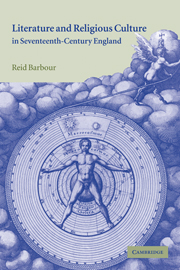Book contents
- Frontmatter
- Contents
- Acknowledgements
- Introduction: spirit and circumstance in Caroline Protestantism
- Chapter 1 The church heroic: Charles, Laud, and Little Gidding
- Chapter 2 Great Tew and the skeptical hero
- Chapter 3 Between liturgy and dreams: the church fanciful
- Chapter 4 Respecting persons
- Chapter 5 Decorum and redemption in the theater of the person
- Chapter 6 Nature (I): post-Baconian mysteries
- Chapter 7 Nature (II): church and cosmos
- Conclusion: Rome, Massachusetts, and the Caroline Protestant imagination
- Notes
- Index
Chapter 7 - Nature (II): church and cosmos
Published online by Cambridge University Press: 22 September 2009
- Frontmatter
- Contents
- Acknowledgements
- Introduction: spirit and circumstance in Caroline Protestantism
- Chapter 1 The church heroic: Charles, Laud, and Little Gidding
- Chapter 2 Great Tew and the skeptical hero
- Chapter 3 Between liturgy and dreams: the church fanciful
- Chapter 4 Respecting persons
- Chapter 5 Decorum and redemption in the theater of the person
- Chapter 6 Nature (I): post-Baconian mysteries
- Chapter 7 Nature (II): church and cosmos
- Conclusion: Rome, Massachusetts, and the Caroline Protestant imagination
- Notes
- Index
Summary
Browne's Religio Medici and Harvey's De Generatione epitomize how complex and exploratory the calibration of natural theology becomes in Caroline England. In their framing of religious circumstances with problems in natural theology, Browne and Harvey were the fruition of an English religious culture in the 1620s and 30s that featured such conflicted texts as Donne's Devotions of 1624. Throughout his career, Donne sustains no consistent attitude toward the “new philosophy,” but in the Devotions, he struggles to interweave a theory of natural plenism and holism with his belief in the ceremonial unity of the church. This fusion is meant to counter the frightening possibility that community and correspondence can no longer protect the witty self from isolation and singularity. Writing in the years of Bacon's Great Instauration, that is, Donne struggles against those compelling models of the mind and of nature that threaten to destroy his argument for holism, plenism, and plurality. Defined both as cosmic correspondence and ritual context, the network of circumstances in “Natures nest of Boxes” extends the pneumatic spirit of imagination outward from the isolated patient to the world at large, especially by way of analogies. Far from resting assured in the holism of church and cosmos, however, Donne equivocates about whether the thoughts and intentions of the solitary wit necessarily remain within the nest.
- Type
- Chapter
- Information
- Literature and Religious Culture in Seventeenth-Century England , pp. 210 - 235Publisher: Cambridge University PressPrint publication year: 2001

